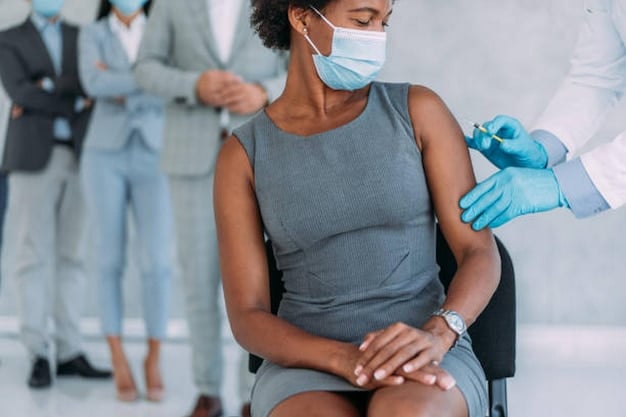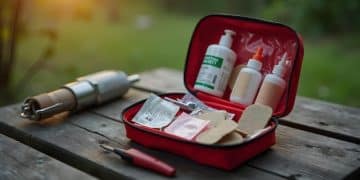Stay Healthy While Traveling: Your Ultimate Guide to Avoiding Illness

Staying healthy while traveling involves proactive measures such as sanitizing hands, staying hydrated, getting enough sleep, and being mindful of food and water safety to minimize the risk of illness on the road.
Planning a trip should be exciting, not a prelude to getting sick. To ensure you enjoy every moment, learn how to stay healthy while traveling, keeping illnesses at bay and making the most of your adventures.
Prioritize Pre-Trip Health Preparations
Before you even pack your bags, preparing your health should be a priority. This involves several key steps to ensure you’re in top shape and ready to handle the challenges of travel.
Consult Your Doctor
A visit to your healthcare provider is essential. They can provide personalized advice based on your destination, health history, and planned activities. This consultation should ideally occur several weeks before your departure.
Get Vaccinations and Necessary Medications
Depending on your destination, certain vaccinations may be required or recommended. Ensure you’re up to date on routine vaccines and receive any additional ones advised by your doctor. Also, discuss any necessary medications, such as malaria preventatives or altitude sickness remedies.

Taking proactive steps before your trip can significantly reduce your risk of illness and ensure you have a smooth and enjoyable travel experience.
Build a Basic First-Aid Kit
- Band-aids and antiseptic wipes: For minor cuts and scrapes.
- Pain relievers: Such as ibuprofen or acetaminophen for headaches and muscle pain.
- Anti-diarrheal medication: To combat traveler’s diarrhea.
- Motion sickness remedies: If you’re prone to motion sickness, bring medication or ginger candies.
By prioritizing pre-trip health preparations, you can minimize risks and enjoy your travels with peace of mind. These initial steps are crucial for a healthy and memorable adventure.
Maintain Strict Hygiene Practices
Good hygiene is paramount when traveling, as you’re exposed to new environments and potential pathogens. Simple habits can make a big difference in preventing illness.
Wash Your Hands Frequently
Regular handwashing is one of the most effective ways to prevent the spread of germs. Use soap and water whenever possible, especially before meals and after using public transportation.
Carry Hand Sanitizer
When soap and water aren’t available, hand sanitizer is your next best option. Choose a sanitizer that contains at least 60% alcohol and use it liberally throughout the day.
Avoid Touching Your Face
Germs often enter the body through the eyes, nose, and mouth. Be mindful of touching your face, and wash or sanitize your hands if you must.
Maintaining strict hygiene practices while traveling, such as frequent handwashing and avoiding touching your face, dramatically reduces your risk of exposure to illnesses.
Be Cautious With Public Restrooms
Public restrooms can be breeding grounds for germs. Use paper towels to open doors and turn off faucets. Avoid placing personal items on surfaces, and wash your hands thoroughly afterward.
- Sanitize your seat: Use a sanitizing wipe on toilet seats when possible.
- Carry tissues: Keep a pack of tissues for use where toilet paper may be unavailable.
- Avoid touching surfaces: Use your elbow or foot to operate flush handles and door latches.
By consistently practicing good hygiene, you create a barrier against harmful pathogens, ensuring a healthier and more enjoyable travel experience.
Stay Hydrated and Nourished
Maintaining proper hydration and nutrition is essential for keeping your immune system strong and your body functioning optimally while traveling. Dehydration and poor diet can weaken your defenses and increase your susceptibility to illness.
Drink Plenty of Water
Dehydration can lead to fatigue, headaches, and a weakened immune system. Carry a reusable water bottle and refill it throughout the day. Be mindful of the water quality in different regions and opt for bottled or purified water when necessary.

- Infuse water with fruit: Add lemon, cucumber, or berries to make water more appealing.
- Avoid sugary drinks: Sodas and sugary juices can dehydrate you and provide empty calories.
- Monitor your urine: Pale yellow urine indicates good hydration, while dark urine suggests dehydration.
Eat Nutritious Foods
A balanced diet supports your immune system and provides the energy you need for exploring. Prioritize fresh fruits, vegetables, and lean proteins. Be cautious of street food and ensure it’s prepared hygienically.
By staying hydrated and nourishing your body, you can keep your immune system strong and your energy levels high, allowing you to fully enjoy your travel experiences.
Pack Healthy Snacks
Having healthy snacks on hand can prevent you from resorting to unhealthy options when hunger strikes. Good choices include nuts, seeds, dried fruit, and granola bars.
Proper hydration and nutrition are key to maintaining your health and vitality while traveling. Simple choices can significantly impact your well-being on the road.
Ensure Food and Water Safety
Food and waterborne illnesses are common travel ailments. Taking precautions to ensure the safety of what you consume is crucial for staying healthy.
Be Mindful of Water Sources
Drinking contaminated water can lead to serious infections. Stick to bottled water or water that has been properly boiled or purified. Avoid ice cubes in your drinks unless you’re certain they’re made with safe water.
Choose Food Wisely
When eating out, select reputable restaurants that adhere to good hygiene practices. Ensure that food is cooked thoroughly and served hot. Be particularly cautious of raw or undercooked meats and seafood.
Ensuring food and water safety is paramount when traveling. By being mindful of what you consume, you can avoid common travel ailments and protect your health.
Practice Safe Food Handling
If you’re preparing your own meals, wash your hands thoroughly before handling food. Use separate cutting boards for raw and cooked items, and ensure all ingredients are fresh and properly stored.
- Wash fruits and vegetables: Use safe water to wash produce thoroughly.
- Avoid unpasteurized dairy: Opt for pasteurized milk, cheese, and yogurt.
- Be cautious of street food: Only eat from vendors with clean stalls and freshly prepared food.
By being vigilant about food and water safety, you can minimize your risk of illness and enjoy your travels with greater peace of mind.
Get Adequate Sleep
Sleep deprivation can weaken your immune system and make you more susceptible to illness. Prioritizing adequate sleep is essential for maintaining your health and well-being while traveling.
Maintain a Regular Sleep Schedule
Try to stick to your regular sleep schedule as much as possible, even when traveling across time zones. This helps regulate your body’s natural sleep-wake cycle and promotes better sleep quality.
Create a Relaxing Sleep Environment
Make your sleep environment as comfortable and conducive to rest as possible. Use earplugs or a white noise machine to block out disruptive sounds, and adjust the room temperature to your liking.
Adequate sleep is a cornerstone of good health, particularly when traveling. By prioritizing sleep, you strengthen your immune system and enhance your overall well-being.
Use Sleep Aids If Necessary
If you struggle to fall asleep while traveling, consider using natural sleep aids such as melatonin or herbal teas. Consult your doctor before using prescription sleep medications.
- Avoid caffeine and alcohol: These substances can interfere with your sleep.
- Create a bedtime routine: Engage in relaxing activities before bed, such as reading or taking a warm bath.
- Use blackout curtains or an eye mask: To block out light and create a darker sleep environment.
By prioritizing sleep and implementing strategies to improve sleep quality, you can ensure you stay healthy and energized throughout your travels.
Protect Yourself from the Sun and Insects
Exposure to the sun and insect bites can pose significant health risks while traveling. Taking precautions to protect yourself from these elements is crucial for maintaining your well-being.
Use Sunscreen Regularly
Protect your skin from harmful UV rays by applying sunscreen with a high SPF (sun protection factor) every day, even on cloudy days. Reapply sunscreen every two hours, or more frequently if you’re swimming or sweating.
Wear Protective Clothing
Cover exposed skin with lightweight, long-sleeved clothing and wide-brimmed hats. This provides an additional layer of protection against the sun’s rays.
Protecting yourself from the sun and insects is vital for staying healthy while traveling. These measures safeguard you from immediate discomfort and long-term health risks.
Use Insect Repellent
Protect yourself from mosquito bites and other insect-borne diseases by using insect repellent containing DEET or picaridin. Apply repellent to exposed skin and clothing, following the product’s instructions.
- Stay indoors during peak insect hours: Mosquitoes are most active at dawn and dusk.
- Use mosquito nets: When sleeping in areas with high mosquito populations, use a mosquito net over your bed.
- Wear light-colored clothing: Dark colors attract mosquitoes.
By taking these steps, you can minimize your risk of sun damage and insect-borne illnesses, ensuring a healthier and more enjoyable travel experience.
| Key Points | Brief Description |
|---|---|
| 🩺 Pre-Trip Health | Consult your doctor and get necessary vaccinations. |
| 🖐️ Hygiene Practices | Wash hands frequently and carry hand sanitizer. |
| 💧 Hydration & Nutrition | Drink plenty of water and eat nutritious foods. |
| 😴 Adequate Sleep | Maintain a regular sleep schedule and create a relaxing environment. |
Frequently Asked Questions
▼
Vaccination requirements vary by destination. Consult your doctor several weeks before your trip to determine which vaccines are necessary or recommended for your specific travel plans.
▼
Avoid traveler’s diarrhea by drinking bottled water, eating at reputable restaurants, and ensuring food is cooked thoroughly. Carry anti-diarrheal medication and practice good hygiene habits.
▼
The safety of tap water varies by location. In many developing countries, it’s best to avoid tap water and opt for bottled or purified water to prevent waterborne illnesses.
▼
A basic travel first-aid kit should include band-aids, antiseptic wipes, pain relievers, anti-diarrheal medication, motion sickness remedies, and any personal medications you may need.
▼
Protect yourself from mosquito bites by using insect repellent, wearing protective clothing, and using mosquito nets when sleeping in areas with high mosquito populations, especially during peak mosquito activity hours.
Conclusion
Staying healthy while traveling requires a proactive approach, from pre-trip preparations to daily hygiene practices. By following these tips, you can minimize your risk of illness and fully enjoy your travel experiences, creating lasting memories without compromising your well-being.





